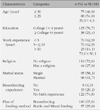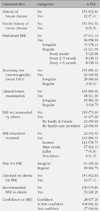Abstract
Purpose
This study aims to determine obstetrics nurses knowledge, attitude, and practice about breast cancer and breast self-examination (BSE), and to contribute to the early detection of breast cancer during breastfeeding periods.
Methods
For the survey, 163 individuals (obstetric nurses) were chosen by convenience sampling and agreed to participate in the study. Their knowledge, attitude, and practice about breast cancer and BSE.
Results
Knowledge
and attitude averaged 70.45±10.90 (of 100) and 3.64±0.27 (of 5), respectively. While most nurses (99%) recognized the importance of BSE, only 58.9% experienced BSE. BSE practice level averaged 8.35±1.96 (of 12). Only 20.2% had recommended BSE to their clients. Practice level varied significantly for different marital status, breastfeeding experience, and education, while knowledge and attitude remained independent. Nurses who had experienced mammogram or breast ultrasonogram themselves scored higher in knowledge. Attitude was higher for nurses who received recommendation for BSE, performed BSE, received BSE education, or recommended BSE to clients. Practice level was higher for nurses who received BSE education or willing to perform BSE in future. Practice level had a positive correlation with attitude but no correlation to knowledge.
Figures and Tables
Table 4
Knowledge, Attitude and Practice about Breast Cancer and Breast Self-examination according to General Characteristics

Table 5
Knowledge, Attitude and Practice about Breast Cancer and Breast Self-examination according to Characteristics related Breast Health

References
1. Bergfeldt K., Nilsson B., Einhorn S., Hall P. Breast cancer risk in women with a primary ovarian cancer - A case-control study. European Journal of Cancer. 2001. 37:2229–2234.
2. Budden L. Registered nurses' breast self-examination practice and teaching to female clients. Journal of Community Health Nursing. 1998. 15(2):101–112.
3. Shin H.R., Won Y.J., Jung K.W., Kong H.J., Yim S.H., Lee J.K., et al. Nationwide cancer incidence in Korea, 1999-2001: First results using the National Cancer Incidence Database. Cancer Research and Treatment. 2005. 37:325–331.
4. Choi K.O. A study of nurse's knowledge, attitudes and practices of breast self-examination. Journal of Korean Academy of Adult Nursing. 1994. 6(1):80–100.
5. Cohen J. Statistical power analysis for the behavioral sciences. 1988. 2nd ed. Hillsdal, NJ: Lawrence Earlbaum Associates.
6. Ertem G., Kocer A. Breast self-examination among nurses and midwives in Odemis health district in Turkey. Indian Journal of Cancer. 2009. 46(3):208–213.
7. Hwang M.A. The relationships between breast selfexamination knowledge, health belief, self-efficacy and practice of nurse. 2009. JinJu: Gyeongsang National University;Unpublished master's thesis.
8. Kim A.L. The effect of audiovisual information with videotape influencing on knowledge and attitude of breast self examination. Journal of Korean Academy of Adult Nursing. 1994. 6(1):112–124.
9. Kim E.G. Factors influencing on the compliance of breast self-examination among women and nurse. 2003. Busan: Pusan National University;Unpublished master's thesis.
10. Kim E.K., Lee H.J., Ahn S.H., Chung E.S. Factors influencing on the compliance of breast self-examination of nurses in a local area. Journal of Korean Academy of Nursing. 2003. 33(7):1047–1056.
11. Lee C.H., Kim Y.I., Jung H.S., Kim J.Y. Analysis of factors affecting occupational health nurses' early breast cancer screening. Journal of Korean Community Nursing. 2005. 16(1):68–76.
12. Lee E.J. Affecting factors of breast self-examination practice among hospital nurses. 2002. Daejeon: Daejeon University;Unpublished Doctoral Dissertation.
13. Lee E.H. Breast self-examination performance among Korean nurses. Journal for Nurses in Staff Development. 2003. 19:81–87.
14. Lee E.S. The role of breast self-examination and mammography. Journal of Radiological Science and Technology. 2002. 25(1):7–11.
15. Lee S.R. A case-control study on related factors of breast cancer in Korean women. Health and Social Science. 2001. 10:97–115.
16. National cancer control program. National Cancer Center. Retrieved April 1, 2006. from http://www.ncc.re.kr/index.jsp.
17. Paik N.S. Current status of breast cancer in Korea, Panel discussion at the annual meeting of the global breast cancer conference. 2009. 10. Seoul, Korea.
18. Park N.J., Kang D.H. Breast cancer risk and immune responses in healthy women. Oncology Nursing Forum. 2006. 33(6):1151–1159.
19. Park S.M., Hur H.K., Kim G.Y., Song H.Y. A descriptive study for developing a program to promote compliance with regular breast self-examination (BSE). Korean Journal of Women Health Nursing. 2007. 13(2):88–97.
20. Park S.M., Kim B.H., Park M.J., Ahn Y.H., Chung C.W. Effects on nursing students of cognition-behavior integrated breast cancer prevention education using an interchangeable nodule model. Korean Journal of Women Health Nursing. 2010. 16(2):166–176.
21. Report about Health Problems and Policies by Women Lifecycle. 2000. Seoul: Ministry of Health & Welfare.
22. Rothstein W.G. Dietary fat, coronary heart disease and cancer: A historical review. Preventive Medicine. 2006. 43:356–360.
23. Salazar M.K., Carter W.B. Evaluation of breast self-examination beliefs using a decision model. Western Journal of Nursing Research. 1993. 15:403–421.
24. Seo Y.O. The difference of women's knowledge, attitudes and practice education after education for breast self-examination. Journal of Korean Academy of Adult Nursing. 2003. 15(1):5–13.
25. Sim E.S. Factors of periodic medical check-up on breast cancer among nurses. 2008. Busan: Kosin University;Unpublished master's thesis.
26. Smith R.P., D'orsi C.J. Screening for breast cancer. 1999. Philadelphia: Lippincott Willams and Wilkins.
27. Son B.H., Ahn S.H., Kwak B.S., Kim J.K., Kim H.J., Hong S.J., et al. The recurrence rate, risk factors and recurrence patterns after surgery in 3,700 patients with operable breast cancer. Journal of Breast Cancer. 2006. 9:134–144.
28. Soyer M.T., Ciceklioglu M., Ceber E. Breast cancer awareness and practice of breast self examination among primary health care nurses: Influencing factors and effects of an in-service education. Journal of Clinical Nursing. 2007. 16(4):707–715.
29. Tae Y.S., Kim S.J. Knowledge, attitudes and practices about breast self-examination of clinical nurses. Kosin Medical Journal. 2003. 18(1):128–141.
30. Yang S.A. A study on the relationship between practice of breast self-examination and health belief model variables in middle aged women. 1996. Seoul: Ewha Womans University;Unpublished master's thesis.




 PDF
PDF ePub
ePub Citation
Citation Print
Print







 XML Download
XML Download